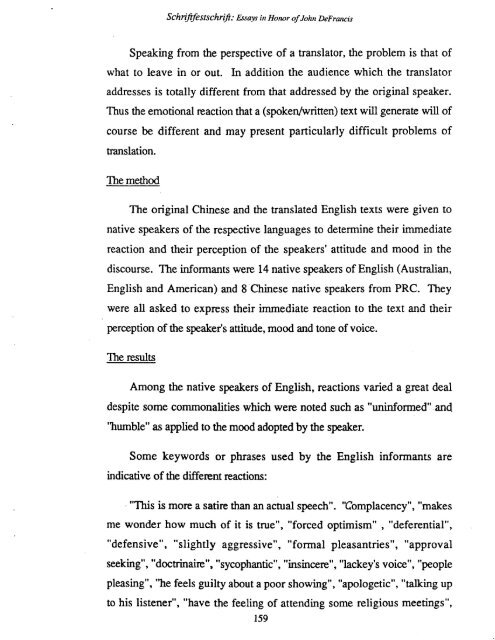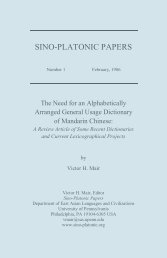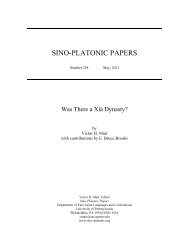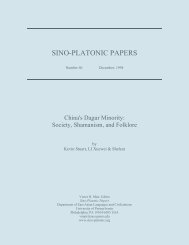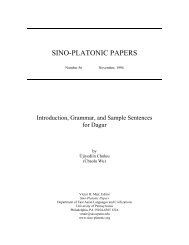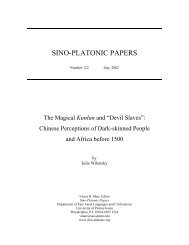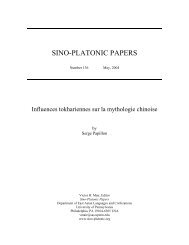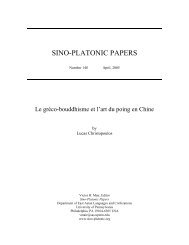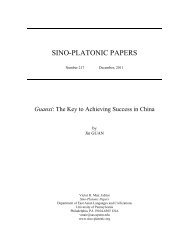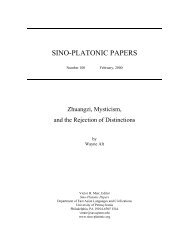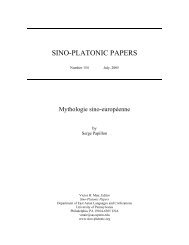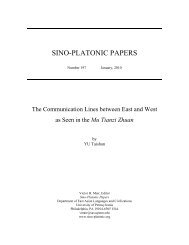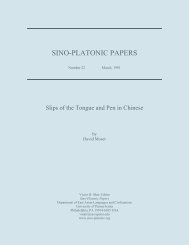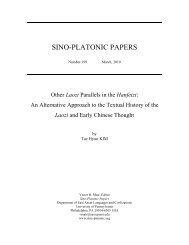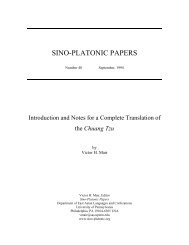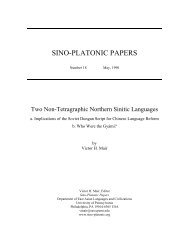Essays on Writing and Language in Honor - Sino-Platonic Papers
Essays on Writing and Language in Honor - Sino-Platonic Papers
Essays on Writing and Language in Honor - Sino-Platonic Papers
Create successful ePaper yourself
Turn your PDF publications into a flip-book with our unique Google optimized e-Paper software.
SchriJEfestschhr$: <str<strong>on</strong>g>Essays</str<strong>on</strong>g> <strong>in</strong> H<strong>on</strong>or of John DeFrmis<br />
Speak<strong>in</strong>g from the perspective of a translator, the problem is that of<br />
what to leave <strong>in</strong> or out. In additi<strong>on</strong> the audience which the translator<br />
addresses is totally different from that addressed by the orig<strong>in</strong>al speaker.<br />
Thus the emoti<strong>on</strong>al reacti<strong>on</strong> that a (spokentwritten) text will generate will of<br />
course be different <strong>and</strong> may present particularly difficult problems of<br />
translati<strong>on</strong>.<br />
The method<br />
The orig<strong>in</strong>al Ch<strong>in</strong>ese <strong>and</strong> the translated English texts were given to<br />
native speakers of the respective languages to determ<strong>in</strong>e their immediate<br />
reacti<strong>on</strong> <strong>and</strong> their percepti<strong>on</strong> of the speakers' attitude <strong>and</strong> mood <strong>in</strong> the<br />
discourse. The <strong>in</strong>formants were 14 native speakers of English (Australian,<br />
English <strong>and</strong> American) <strong>and</strong> 8 'Ch<strong>in</strong>ese native speakers from PRC. They<br />
were all asked to express their immediate reacti<strong>on</strong> to the text <strong>and</strong> their<br />
percepti<strong>on</strong> of the speaker's attitude, mood <strong>and</strong> t<strong>on</strong>e of voice.<br />
The mults<br />
Am<strong>on</strong>g the native speakers of English, reacti<strong>on</strong>s varied a great deal<br />
despite some comm<strong>on</strong>alities which were noted such as "un<strong>in</strong>formed". <strong>and</strong><br />
"humb1e" as applied to the mood adopted by the speaker.<br />
Some keywords or phrases used by the English <strong>in</strong>formants are<br />
<strong>in</strong>dicative of the different reacti<strong>on</strong>s:<br />
"This is more a satire than an actual speech". "Complacency", "makes<br />
me w<strong>on</strong>der how much of it is true", "forced optimism" , "deferential",<br />
"defensive", "slightly aggressive", "formal pleasantries", "approval<br />
seek<strong>in</strong>g", "doctr<strong>in</strong>aire", "sycophantic", "<strong>in</strong>s<strong>in</strong>cere", "lackey's voice", "people<br />
pleas<strong>in</strong>g", "he feels guilty about a poor show<strong>in</strong>g", "apologetic", "talk<strong>in</strong>g up<br />
to his listener", "have the feel<strong>in</strong>g of attend<strong>in</strong>g some religious meet<strong>in</strong>gs",<br />
159


